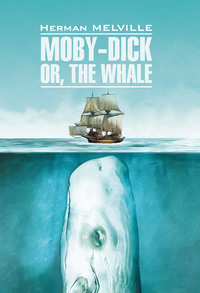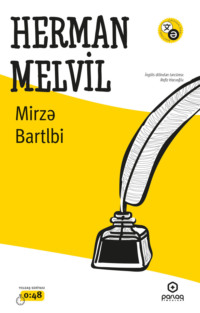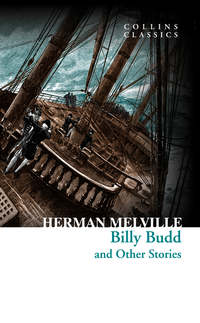
Полная версия
Moby Dick
Like Captain Peleg, Captain Bildad was a well-to-do, retired whaleman. But unlike Captain Peleg—who cared not a rush for what are called serious things, and indeed deemed those self-same serious things the veriest of all trifles—Captain Bildad had not only been originally educated according to the strictest sect of Nantucket Quakerism, but all his subsequent ocean life, and the sight of many unclad, lovely island creatures, round the Horn—all that had not moved this native born Quaker one single jot, had not so much as altered one angle of his vest. Still, for all this immutableness, was there some lack of common consistency about worthy Captain Peleg. Though refusing, from conscientious scruples, to bear arms against land invaders, yet himself had illimitably invaded the Atlantic and Pacific; and though a sworn foe to human bloodshed, yet had he in his straight-bodied coat, spilled tuns upon tuns of Leviathan gore. How now in the contemplative evening of his days, the pious Bildad reconciled these things in the reminiscence, I do not know; but it did not seem to concern him much, and very probably he had long since come to the sage and sensible conclusion that a man’s religion is one thing, and this practical world quite another. This world pays dividends. Rising from a little cabin-boy in short clothes of the drabbest drab, to a harpooneer in a broad shad-bellied waistcoat; from that becoming boat header, chief-mate, and captain, and finally a shipowner; Bildad, as I hinted before, had concluded his adventurous career by wholly retiring from active life at the goodly age of sixty, and dedicating his remaining days to the quiet receiving of his well-earned income.
Now Bildad, I am sorry to say, had the reputation of being an incorrigible old hunks, and in his sea-going days, a bitter, hard taskmaster. They told me in Nantucket, though it certainly seems a curious story, that when he sailed the old Categut whaleman, his crew, upon arriving home, were mostly all carried ashore to the hospital, sore exhausted and worn out. For a pious man, especially for a Quaker, he was certainly rather hardhearted, to say the least. He never used to swear, though, at his men, they said; but somehow he got an inordinate quantity of cruel, unmitigated hard work out of them. When Bildad was a chief-mate, to have his drab-coloured eye intently looking at you, made you feel completely nervous, till you could clutch something—a hammer or a marling-spike, and go to work like mad, at something or other, never mind what. Indolence and idleness perished from before him. His own person was the exact embodiment of his utilitarian character. On his long, gaunt body, he carried no spare flesh, no superfluous beard, his chin having a soft economical nap to it, like the worn nap of his broad brimmed hat.
Such, then, was the person that I saw seated on the transom when I followed Captain Peleg down into the cabin. The space between the decks was small; and there, bolt upright, sat old Bildad, who always sat so, and never leaned, and this to save his coat-tails. His broad-brim was placed beside him; his legs were stiffly crossed; his drab vesture was buttoned up to his chin; and spectacles on nose, he seemed absorbed in reading from a ponderous volume.
‘Bildad,’ cried Captain Peleg, ‘at it again, Bildad, eh? Ye have been studying those Scriptures, now, for the last thirty years, to my certain knowledge. How far ye got, Bildad?’
As if long habituated to such profane talk from his old shipmate, Bildad, without noticing his present irreverence, quietly looked up, and seeing me, glanced again inquiringly towards Peleg.
‘He says he’s our man, Bildad,’ said Peleg, ‘he wants to ship.’
‘Dost thee?’ said Bildad, in a hollow tone, and turning round to me.
‘I dost,’ said I unconsciously, he was so intense a Quaker.
‘What do ye think of him, Bildad?’ said Peleg.
‘He’ll do,’ said Bildad, eyeing me, and then went on spelling away at his book in a mumbling tone quite audible.
I thought him the queerest old Quaker I ever saw, especially as Peleg, his friend and old shipmate, seemed such a blusterer. But I said nothing, only looking round me sharply. Peleg now threw open a chest, and drawing forth the ship’s articles, placed pen and ink before him, and seated himself at a little table. I began to think it was high time to settle with myself at what terms I would be willing to engage for the voyage. I was already aware that in the whaling business they paid no wages; but all hands, including the captain, received certain shares of the profits called lays, and that these lays were proportioned to the degree of importance pertaining to the respective duties of the ship’s company. I was also aware that being a green hand at whaling, my own lay would not be very large; but considering that I was used to the sea, could steer a ship, splice a rope, and all that, I made no doubt that from all I had heard I should be offered at least the 275th lay—that is, the 275th part of the clear net proceeds of the voyage, whatever that might eventually amount to. And though the 275th lay was what they call a rather long lay, yet it was better than nothing; and if we had a lucky voyage, might pretty nearly pay for the clothing I would wear out on it, not to speak of my three years’ beef and board, for which I would not have to pay one stiver.
It might be thought that this was a poor way to accumulate a princely fortune—and so it was, a very poor way indeed. But I am one of those who never take on about princely fortunes, and am quite content if the world is ready to board and lodge me, while I am putting up at this grim sign of the Thunder Cloud. Upon the whole, I thought the 275th lay would be about the fair thing, but would not have been surprised had I been offered the 200th, considering I was of a broad-shouldered make.
But one thing, nevertheless, that made me a little distrustful about receiving a generous share of the profits was this: Ashore, I had heard something of both Captain Peleg and his unaccountable old crony Bildad; how that they being the principal proprietors of the Pequod, therefore the other and more inconsiderable and scattered owners, left nearly the whole management of the ship’s affairs to these two. And I did not know but what the stingy old Bildad might have a mighty deal to say about shipping hands, especially as I now found him on board the Pequod, quite at home there in the cabin, and reading his Bible as if at his own fireside. Now while Peleg was vainly trying to mend a pen with his jack-knife, old Bildad, to my no small surprise, considering that he was such an interested party in these proceedings; Bildad never heeded us, but went on mumbling to himself out of his book, ‘Lay not up for yourselves treasures upon earth, where moth—’
‘Well, Captain Bildad,’ interrupted Peleg, ‘what d’ye say, what lay shall we give this young man?’
‘Thou knowest best,’ was the sepulchral reply, ‘the seven hundred and seventy-seventh wouldn’t be too much, would it?—“where moth and rust do corrupt, but lay—”’
Lay, indeed, thought I, and such a lay! the seven hundred and seventy-seventh! Well, old Bildad, you are determined that I, for one, shall not lay up many lays here below, where moth and rust do corrupt. It was an exceedingly long lay that, indeed; and though from the magnitude of the figure it might at first deceive a landsman, yet the slightest consideration will show that though seven hundred and seventy-seven is a pretty large number, yet, when you come to make a teenth of it, you will then see, I say, that the seven hundred and seventy-seventh part of a farthing is a good deal less than seven hundred and seventy-seven gold doubloons; and so I thought at the time.
‘Why, blast your eyes, Bildad,’ cried Peleg, ‘thou dost not want to swindle this young man! he must have more than that.’
‘Seven hundred and seventy-seventh,’ again said Bildad, without lifting his eyes; and then went on mumbling—‘for where your treasure is, there will your heart be also.’
‘I am going to put him down for the three hundredth,’ said Peleg, ‘do ye hear that, Bildad! The three hundred lay, I say.’
Bildad laid down his book, and turning solemnly towards him said, ‘Captain Peleg, thou hast a generous heart; but thou must consider the duty thou owest to the other owners of this ship—widows and orphans, many of them—and that if we too abundantly reward the labours of this young man, we may be taking the bread from those widows and those orphans. The seven hundred and seventy-seventh lay, Captain Peleg.’
‘Thou Bildad!’ roared Peleg, starting up and clattering about the cabin. ‘Blast ye, Captain Bildad, if I had followed thy advice in these matters, I would afore now had a conscience to lug about that would be heavy enough to founder the largest ship that ever sailed round Cape Horn.’
‘Captain Peleg,’ said Bildad steadily, ‘thy conscience may be drawing ten inches of water, on ten fathoms, I can’t tell; but as thou art still an impenitent man, Captain Peleg, I greatly fear lest thy conscience be but a leaky one; and will in the end sink thee foundering down to the fiery pit, Captain Peleg.’
‘Fiery pit! fiery pit! ye insult me, man; past all natural bearing, ye insult me. It’s an all-fired outrage to tell any human creature that he’s bound to hell. Flukes and flames! Bildad, say that again to me, and start my soul-bolts, but I’ll—I’ll—yes, I’ll swallow a live goat with all his hair and horns on. Out of the cabin, ye canting, drab-coloured son of a wooden gun—a straight wake with ye!’
As he thundered out this he made a rush at Bildad, but with a marvellous oblique, sliding celerity, Bildad for that time eluded him.
Alarmed at this terrible outburst between the two principal and responsible owners of the ship, and feeling half a mind to give up all idea of sailing in a vessel so questionably owned and temporarily commanded, I stepped aside from the door to give egress to Bildad, who, I made no doubt, was all eagerness to vanish from before the awakened wrath of Peleg. But to my astonishment, he sat down again on the transom very quietly, and seemed to have not the slightest intention of withdrawing. He seemed quite used to impenitent Peleg and his ways. As for Peleg, after letting off his rage as he had, there seemed no more left in him and he, too, sat down like a lamb, though he twitched a little as if still nervously agitated. ‘Whew!’ he whistled at last—‘the squall’s gone off to leeward, I think. Bildad, thou used to be good at sharpening a lance, mend that pen, will ye. My jack-knife here needs the grindstone. That’s he; thank ye, Bildad. Now then, my young man, Ishmael’s thy name, didn’t ye say? Well then, down ye go here, Ishmael, for the three hundredth lay.’
‘Captain Peleg,’ said I, ‘I have a friend with me who wants to ship too—shall I bring him down to-morrow?’
‘To be sure,’ said Peleg. ‘Fetch him along, and we’ll look at him.’
‘What lay does he want?’ groaned Bildad, glancing up from the book in which he had again been burying himself.
‘Oh! never thee mind about that, Bildad,’ said Peleg. ‘Has he ever whaled it any?’ turning to me.
‘Killed more whales than I can count, Captain Peleg.’
‘Well, bring him along then.’
And, after signing the papers, off I went; nothing doubting but that I had done a good morning’s work, and that the Pequod was the identical ship that Yojo had provided to carry Queequeg and me round the Cape.
But I had not proceeded far, when I began to bethink me that the Captain with whom I was to sail yet remained unseen by me; though, indeed, in many cases, a whale-ship will be completely fitted out, and receive all her crew on board, ere the captain makes himself visible by arriving to take command: for sometimes these voyages are so prolonged, and the shore intervals at home so exceedingly brief, that if the captain have a family, or any absorbing concernment of that sort, he does not trouble himself much about his ship in port, but leaves her to the owners till all is ready for sea. However, it is always as well to have a look at him before irrevocably committing yourself into his hands. Turning back I accosted Captain Peleg, inquiring where Captain Ahab was to be found.
‘And what dost thou want of Captain Ahab? It’s all right enough; thou art shipped.’
‘Yes, but I should like to see him.’
‘But I don’t think thou wilt be able to at present. I don’t know exactly what’s the matter with him; but he keeps close inside the house; a sort of sick, and yet he don’t look so. In fact, he ain’t sick; but no, he isn’t well either. Any how, young man, he won’t always see me, so I don’t suppose he will thee. He’s a queer man, Captain Ahab—so some think—but a good one. Oh, thou’lt like him well enough; no fear, no fear. He’s a grand, ungodly, godlike man, Captain Ahab; doesn’t speak much; but, when he does speak, then you may well listen. Mark ye, be fore-warned; Ahab’s above the common; Ahab’s been in colleges, as well as ‘mong the cannibals; been used to deeper wonders than the waves; fixed his fiery lance in mightier, stranger foes than whales. His lance! aye, the keenest and surest that out of all our isle! Oh! he ain’t Captain Bildad; no, and he ain’t Captain Peleg; he’s Ahab, boy; and Ahab of old, thou knowest, was a-crowned king!’
‘And a very vile one. When that wicked king was slain, the dogs, did they not lick his blood?’
‘Come hither to me—hither, hither,’ said Peleg, with a significance in his eye that almost startled me. ‘Look ye, lad; never say that on board the Pequod. Never say it anywhere. Captain Ahab did not name himself. ‘Twas a foolish, ignorant whim of his crazy, widowed mother, who died when he was only a twelvemonth old. And yet the old squaw Tistig, at Gayhead, said that the name would somehow prove prophetic. And, perhaps, other fools like her may tell thee the same. I wish to warn thee. It’s a lie. I know Captain Ahab well; I’ve sailed with him as mate years ago; I know what he is—a good man—not a pious, good man, like Bildad, but a swearing good man—something like me—only there’s a good deal more of him. Aye, aye, I know that he was never very jolly; and I know that on the passage home, he was a little out of his mind for a spell; but it was the sharp shooting pains in his bleeding stump that brought that about, as any one might see. I know, too, that ever since he lost his leg last voyage by that accursed whale, he’s been a kind of moody—desperate moody, and savage sometimes; but that will all pass off. And once for all, let me tell thee and assure thee, young man, it’s better to sail with a moody good captain than a laughing bad one. So good-bye to thee—and wrong not Captain Ahab, because he happens to have a wicked name. Besides, my boy, he has a wife—not three voyages wedded—a sweet, resigned girl. Think of that; by that sweet girl that old man had a child: hold ye then there can be any utter, hopeless harm in Ahab? No, no, my lad; stricken, blasted, if he be, Ahab has his humanities!’
As I walked away, I was full of thoughtfulness; what had been incidentally revealed to me of Captain Ahab, filled me with a certain wild vagueness of painfulness concerning him. And somehow, at the time, I felt a sympathy and a sorrow for him, but for I don’t know what, unless it was the cruel loss of his leg. And yet I also felt a strange awe of him; but that sort of awe, which I cannot at all describe, was not exactly awe; I do not know what it was. But I felt it; and it did not disincline me towards him; though I felt impatience at what seemed like mystery in him, so imperfectly as he was known to me then. However, my thoughts were at length carried in other directions, so that for the present dark Ahab slipped my mind.
CHAPTER 17
The Ramadan
As Queequeg’s Ramadan, or Fasting and Humiliation, was to continue all day, I did not choose to disturb him till towards nightfall; for I cherish the greatest respect towards everybody’s religious obligations, never mind how comical, and could not find it in my heart to undervalue even a congregation of ants worshipping a toadstool; or those other creatures in certain parts of our earth, who with a degree of footmanism quite unprecedented in other planets, bow down before the torso of a deceased landed proprietor merely on account of the inordinate possessions yet owned and rented in his name.
I say, we good Presbyterian Christians should be charitable in these things, and not fancy ourselves so vastly superior to other mortals, pagans and what not, because of their half-crazy conceits on these subjects. There was Queequeg, now, certainly entertaining the most absurd notions about Yojo and his Ramadan;—but what of that? Queequeg thought he knew what he was about, I suppose; he seemed to be content; and there let him rest. All our arguing with him would not avail; let him be, I say: and Heaven have mercy on us all—Presbyterians and Pagans alike—for we are all somehow dreadfully cracked about the head, and sadly need mending.
Towards evening, when I felt assured that all his performances and rituals must be over, I went up to his room and knocked at the door; but no answer. I tried to open it, but it was fastened inside. ‘Queequeg,’ said I softly through the keyhole—all silent. ‘I say, Queequeg! why don’t you speak? It’s I—Ishmael.’ But all remained still as before. I began to grow alarmed. I had allowed him such abundant time; I thought he might have had an apoplectic fit. I looked through the key-hole; but the door opening into an odd corner of the room, the key-hole prospect was but a crooked and sinister one. I could only see part of the foot-board of the bed and a line of the wall, but nothing more. I was surprised to behold resting against the wall the wooden shaft of Queequeg’s harpoon, which the landlady the evening previous had taken from him, before our mounting to the chamber. That’s strange, thought I; but at any rate, since the harpoon stands yonder, and he seldom or never goes abroad without it, therefore he must be inside here, and no possible mistake.
‘Queequeg!—Queequeg!’—all still. Something must have happened. Apoplexy! I tried to burst open the door; but it stubbornly resisted. Running down stairs, I quickly stated my suspicions to the first person I met—the chambermaid. ‘La! la!’ she cried, ‘I thought something must be the matter. I went to make the bed, after breakfast, and the door was locked; and not a mouse to be heard; and it’s been just so silent ever since. But I thought, may be, you had both gone off and locked your baggage in for safe keeping. La! La! ma’am,—Mistress! murder! Mrs. Hussey! apoplexy!’—and with these cries she ran towards the kitchen, I following.
Mrs. Hussey soon appeared, with a mustard-pot in one hand and a vinegar-cruet in the other, having just broken away from the occupation of attending to the casters, and scolding her little black boy meantime.
‘Wood-house!’ cried I, ‘which way to it? Run for God’s sake, and fetch something to pry open the door—the axe!—the axe!—he’s had a stroke; depend upon it!’—and so saying I was unmethodically rushing up stairs again empty-handed, when Mrs. Hussey interposed the mustard-pot and vinegar-cruet, and the entire castor of her countenance.
‘What’s the matter with you, young man?’
‘Get the axe! For God’s sake, run for the doctor, some one, while I pry it open!’
‘Look here,’ said the landlady, quickly putting down the vinegar-cruet, so as to have one hand free; ‘look here; are you talking about prying open any of my doors?’—and with that she seized my arm. ‘What’s the matter with you? What’s the matter with you, shipmate?’
In as calm, but rapid a manner as possible, I gave her to understand the whole case. Unconsciously clapping the vinegar-cruet to one side of her nose, she ruminated for an instant; then exclaimed—‘No! I haven’t seen it since I put it there.’ Running to a little closet under the landing of the stairs, she glanced in, and returning, told me that Queequeg’s harpoon was missing. ‘He’s killed himself,’ she cried. ‘It’s unfort’nate Stiggs done over again—there goes another counterpane—God pity his poor mother!—it will be the ruin of my house. Has the poor lad a sister? Where’s that girl?—there, Betty, go to Snarles the Painter, and tell him to paint me a sign, with—“no suicides permitted here, and no smoking in the parlour”;—might as well kill both birds at once. Kill? The Lord be merciful to his ghost! What’s that noise there? You, young man, avast there!’
And running after me, she caught me as I was again trying to force open the door.
‘I won’t allow it; I won’t have my premises spoiled. Go for the locksmith, there’s one about a mile from here. But avast!’ putting her hand in her side pocket, ‘here’s a key that’ll fit, I guess; let’s see.’ And with that, she turned it in the lock; but, alas! Queequeg’s supplemental bolt remained unwithdrawn within.
‘Have to burst it open,’ said I, and was running down the entry a little, for a good start, when the landlady caught at me, again vowing I should not break down her premises; but I tore from her, and with a sudden bodily rush dashed myself full against the mark.
With a prodigious noise the door flew open, and the knob slamming against the wall, sent the plaster to the ceiling; and there, good heavens! there sat Queequeg, altogether cool and self-collected; right in the middle of the room; squatting on his hams, and holding Yojo on top of his head. He looked neither one way nor the other way, but sat like a carved image with scarce a sign of active life.
‘Queequeg,’ said I, going up to him, ‘Queequeg, what’s the matter with you?’
‘He hain’t been a sittin’ so all day, has he?’ said the landlady.
But all we said, not a word could we drag out of him; I almost felt like pushing him over, so as to change his position, for it was almost intolerable, it seemed so painfully and unnaturally constrained; especially, as in all probability he had been sitting so for upwards of eight or ten hours, going too without his regular meals.
‘Mrs. Hussey,’ said I, ‘he’s alive at all events; so leave us, if you please, and I will see to this strange affair myself.’
Closing the door upon the landlady, I endeavoured to prevail upon Queequeg to take a chair; but in vain. There he sat; and all he could do—for all my polite arts and blandishments—he would not move a peg, nor say a single word, not even look at me, nor notice my presence in any the slightest way.
I wonder, thought I, if this can possibly be a part of his Ramadan; do they fast on their hams that way in his native island. It must be so; yes, it’s a part of his creed, I suppose; well, then, let him rest; he’ll get up sooner or later, no doubt. It can’t last for ever, thank God, and his Ramadan only comes once a year; and I don’t believe it’s very punctual then.
I went down to supper. After sitting a long time listening to the long stories of some sailors who had just come from a plum-pudding voyage, as they called it (that is, a short whaling-voyage in a schooner or brig, confined to the north of the line, in the Atlantic Ocean only); after listening to these plum-puddingers till nearly eleven o’clock, I went up stairs to go to bed, feeling quite sure by this time Queequeg must certainly have brought his Ramadan to a termination. But no; there he was just where I had left him; he had not stirred an inch. I began to grow vexed with him; it seemed so downright senseless and insane to be sitting there all day and half the night on his hams in a cold room, holding a piece of wood on his head.
‘For heaven’s sake, Queequeg, get up and shake yourself; get up and have some supper. You’ll starve; you’ll kill yourself, Queequeg.’ But not a word did he reply.
Despairing of him, therefore, I determined to go to bed and to sleep; and no doubt, before a great while, he would follow me. But previous to turning in, I took my heavy bearskin jacket and threw it over him, as it promised to be a very cold night; and he had nothing but his ordinary round jacket on. For some time, do all I would, I could not get into the faintest doze. I had blown out the candle; and the mere thought of Queequeg—not four feet off—sitting there in that uneasy position, stark alone in the cold and dark; this made me really wretched. Think of it; sleeping all night in the same room with a wide awake pagan on his hams in this dreary, unaccountable Ramadan!








